- Home
- Jerry B. Jenkins
Mark's Story
Mark's Story Read online
MARK’S STORY
OTHER BOOKS IN THE JESUS CHRONICLES
John’s Story: The Last Eyewitness
THE JESUS CHRONICLES
Book Two
MARK’S STORY
THE GOSPEL ACCORDING TO PETER
TIM LAHAYE and JERRY B. JENKINS
PUTNAM PRAISE
Published by G. P. Putnam’s Sons • a member of Penguin Group (USA) Inc. • New York
PUTNAM PRAISE
Published by
G. P. Putnam’s Sons
Publishers Since 1838
a member of the Penguin Group
Penguin Group (USA) Inc., 375 Hudson Street, New York, New York 10014, USA • Penguin Group (Canada), 90 Eglinton Avenue East, Suite 700, Toronto, Ontario M4P 2Y3, Canada (a division of Pearson Penguin Canada Inc.) • Penguin Books Ltd, 80 Strand, London WC2R 0RL, England • Penguin Ireland, 25 St Stephen’s Green, Dublin 2, Ireland (a division of Penguin Books Ltd) • Penguin Group (Australia), 250 Camberwell Road, Camberwell, Victoria 3124, Australia (a division of Pearson Australia Group Pty Ltd) • Penguin Books India Pvt Ltd, 11 Community Centre, Panchsheel Park, New Delhi–110 017, India • Penguin Group (NZ), 67 Apollo Drive, Rosedale, North Shore 0745, Auckland, New Zealand (a division of Pearson New Zealand Ltd) • Penguin Books (South Africa) (Pty) Ltd, 24 Sturdee Avenue, Rosebank, Johannesburg 2196, South Africa
Penguin Books Ltd, Registered Offices: 80 Strand, London WC2R 0RL, England
Copyright © 2007 by LaHaye Publishing Group LLC and the Jerry B. Jenkins Trust All rights reserved. No part of this book may be reproduced, scanned, or distributed in any printed or electronic form without permission. Please do not participate in or encourage piracy of copyrighted materials in violation of the authors’ rights.
Published simultaneously in Canada
Library of Congress Control Number: 2007932396
ISBN: 1-4295-4360-4
This is a work of fiction based on characters and events depicted in the Bible.
While the authors have made every effort to provide accurate telephone numbers and Internet addresses at the time of publication, neither the publisher nor the authors assume any responsibility for errors, or for changes that occur after publication. Further, the publisher does not have any control over and does not assume any responsibility for author or third-party websites or their content.
Scripture is from the New King James Version®. Copyright © 1982 by Thomas Nelson, Inc. All rights reserved. Used by permission.
NEW KING JAMES VERSION®
Build your life On It.TM
TO OUR GRANDCHILDREN AND OUR GREAT-GRANDCHILDREN
May God grant you the strength
to bear the torch,
for as long as He tarries.
CONTENTS
CHAPTER ONE
CHAPTER TWO
CHAPTER THREE
CHAPTER FOUR
CHAPTER FIVE
CHAPTER SIX
CHAPTER SEVEN
CHAPTER EIGHT
CHAPTER NINE
CHAPTER TEN
CHAPTER ELEVEN
THREE YEARS LATER
CHAPTER TWELVE
CHAPTER THIRTEEN
CHAPTER FOURTEEN
CHAPTER FIFTEEN
CHAPTER SIXTEEN
CHAPTER SEVENTEEN
CHAPTER EIGHTEEN
CHAPTER NINETEEN
TWO YEARS LATER
CHAPTER TWENTY
CHAPTER TWENTY-ONE
CHAPTER TWENTY-TWO
CHAPTER TWENTY-THREE
CHAPTER TWENTY-FOUR
CHAPTER TWENTY-FIVE
CHAPTER TWENTY-SIX
CHAPTER TWENTY-SEVEN
CHAPTER TWENTY-EIGHT
CHAPTER TWENTY-NINE
CHAPTER THIRTY
CHAPTER THIRTY-ONE
EPILOGUE
THE WORDS OF MARK
MARK
1 PETER
2 PETER
ONE
The ghastliest night of young John Mark’s life began with intriguing news from his mother, which portended excitement but certainly not treachery and violence.
Having finished the laborious search of the house for leaven, and suffering the deep hunger pangs of the Fast of the Firstborn, the sixteen-year-old looked forward to that evening’s Passover feast, despite the fact that it would be the first without his late father. He had been killed nearly a year before.
“We will enjoy our meal later,” his mother said as they sat in the first-floor great room of their expansive home just inside the walls of Jerusalem. The city was teeming with like-minded pilgrims, eager to celebrate the same event. “But first we have been assigned a very important undertaking of hospitality.”
“Who will be our guests?”
“Well, they will not be here to visit. We are to serve them.”
“The servants will serve them, you mean?”
“Mark, I said what I meant. The servants will help, but it falls to us to serve them. I, by offering the dining room upstairs. You, by overseeing the servants in administering the meal.”
“Who will cook it?”
“The guests themselves.”
“I’m confused.”
“All will become clear. First you are to carry a water pitcher near the Water Gate. From there, two men will follow you—”
“Must it be a pitcher, Mother? Women carry pitchers. I’d be happy to carry water in a wineskin—”
His mother held up a hand. “Please, Mark. Listen first, question second. The Teacher gave me these instructions Himself, and so—”
“Oh! I hoped He and His friends were in town! They will be our visitors?”
“—and so we will follow His wishes to the letter. Peter and John will follow you from the gate to—”
“I love Peter! He—”
His mother stopped Mark with a look. “From the gate to our home, where you will show them to the upper room. You will then make yourself scarce until you are needed, and you will make certain the servants are diligently attending to our friends.”
John Mark had long been intrigued by the occasional visits of Jesus and His disciples. Some had been friends of his parents. About a week after his father had been crushed under a runaway wagon near the Fish Gate, Peter arrived to just spend time with Mark. The sting of the sudden loss permeated the day they spent near Peter’s home in Capernaum on the northern tip of the Sea of Galilee, but seeing Peter’s fishing operation—his boat now run by others—allowed something else, finally, to occupy Mark’s mind at least briefly.
While Peter showed Mark how he skillfully manned the nets, hurling them far and wide to catch sardines and musht and biny, he regaled him with astonishing accounts of his travels with Jesus. The thick, robust Peter—who seemed the closest to Jesus, and a leader among His disciples—had even left his wife, Esther, and their young children at home to follow the Teacher. Mark and Peter had become fast friends, Mark deeply admiring the fisherman’s fierce gaze, his direct speech, and his lusty appetite for life. Although no one could ever replace his father, Mark could not imagine what might have become of him without Peter as his friend and mentor, seemingly appearing whenever he needed him most in his grief and groundlessness.
The band of men—all of them, even the Master Himself—were of lowly estate compared to Mark’s family. And yet he enjoyed hearing them talk and laugh and sing, growling out hymns and psalms. Of late, however, danger seemed to follow them. They were no longer so boisterous and happy. Where once they had followed an evening of teaching and parables with humor and teasing, now they often arrived furtively, separately, and spoke in low tones.
Jesus’ fame had spread throughout all of Judea with fantastic stories abounding of His healing the sick, even raising the dea
d. Some said He was Messiah—even Mark’s mother believed that, though Mark himself wasn’t so sure. Was it possible that a mere man he knew personally could be the One whose coming was foretold in ancient texts Mark studied every day?
It didn’t seem likely, and yet Peter too believed this with all his heart. Often Peter’s eyes grew so bright with the tales that Mark had to wonder how much of it was true.
Mark himself wasn’t above crafting a tall tale. One of the great regrets of Mark’s young life was having been caught in a bald-faced lie to his mother. Once, when his cousin Joses was visiting from Cyprus, Mark had claimed the lanky, dark-haired boy’s handcrafted toy as his own. When Joses told his aunt Mary, she demanded the truth from Mark, adding, “Only you will know if you’re being honest with me.”
“I know,” he said, “and I am! I made this myself.”
In less than an hour Mark’s highly developed conscience convicted him, forcing him to confess and willingly accept his mother’s punishment. He returned the toy, of course, and endured a brief but stinging session with the rod. His mother directed Mark back to the Psalms and the laments of his hero David, who often had to plead for God’s forgiveness.
“I CANNOT STRESS ENOUGH how important it is to not draw attention to Peter and John,” his mother said now. “The Teacher Himself asked that no one outside our household know that they will be here.”
“I am not to greet them?”
She shook her head. “That you are carrying a pitcher will be their sign to follow you.”
“But they know me already!”
“You are not to speak to them until you have arrived back here.”
MARK FELT CONSPICUOUS filling the pitcher with water from the well not far from the Water Gate. He prayed no one would recognize him and demand to know why he was doing the work of a woman.
At the appointed hour, Peter and John approached, Peter with a dead lamb over his shoulders, dried blood staining his garment. Mark could tell by how the men looked at each other, nodding and raising their brows, that they were surprised it was he they were to follow. Neither spoke as they followed at a distance, until they came within the shadows afforded by the olive trees lining the portal of Mark’s home.
“Mary,” they said in unison when Mark’s mother appeared. She directed them to the great room, where a servant took the lamb, and Mary signaled Mark to fill a basin with water and also to pour them cups to drink. As they drank, she washed their feet with the water from the basin.
Peter said, “The Teacher asks, ‘Where is the guest room in which I may eat the Passover with My disciples?’”
Mary nodded to her son as she finished drying the men’s feet. They stepped into their sandals and followed Mark up an outer staircase to the spacious area atop the house, made airy by arched openings in the walls. The servants had already set the large dining table up there with the finest candles and dishware in the house and encircled it with reclining couches.
Not far from a grate over a fire of coals, the lamb lay on a wooden preparation table, upon which were also arrayed knives, bread dough, wine, and bitter herbs. Peter whispered to a servant, “And for the haroset?”
“Yes!” Mark said, embarrassed. “Fetch the ingredients, now!” he ordered the servant.
The man hurried off, and Peter drew Mark aside. “Son, a word,” he said. “Remember that these are serving not only you, but also us and the Teacher. They deserve our respect.”
“But Mother had instructed them to have ready everything you need to prepare the—”
“We are all but men, John Mark. Capable of mistakes.”
“But we want everything perfect for—”
“And it will be. That is why we are here now. By the time the others arrive, all will be made ready.”
Mark felt his face redden. “Forgive me.”
Peter threw an arm around Mark. “Fret not. I too have had to learn to treat all the way the Master treats me. It has been a hard lesson.”
Standing so close to Peter, Mark could tell he had strapped a heavy sword and scabbard inside his tunic. “You carry a weapon?”
Peter held a finger to his lips. “One cannot be too careful.”
The servant returned with dried fruit, spices, pomegranates, nuts, dates, and a goblet of vinegar. He bowed, eyes downcast, and appeared surprised when young Mark thanked him profusely.
“Now leave us,” Peter said, “as we prepare the meal.”
AS THE OTHER DISCIPLES began to arrive—in pairs or small groups—the servants were pressed into assisting Mary and Mark in welcoming them, washing their feet, giving them water, and directing them upstairs. Simon, Thomas, and Philip arrived together, and several minutes later Matthew and Judas Iscariot. James—the brother of John—Andrew, the other Judas, and Bartholomew were next, and finally the other James accompanied Jesus.
Mark had long been fascinated by these men, all about twice his age save John, just ten years older. Some—like Judas Iscariot and Andrew—were friendlier than others. Some—like Matthew—kept to themselves. Though Mark knew Peter best, he also found Judas and Andrew personable and animated. He was drawn to Jesus, as most seemed to be, and yet Mark also felt most self-conscious when he had the Teacher’s attention. The Man seemed to study his face and truly listen to every word, somehow making Mark feel as if he had hardly anything of import to say. He also felt somehow unworthy in the Man’s presence, as if Jesus knew what kind of a person Mark really was. Had his mother told Him of his propensity for deceit? For conceit? Of his impatience? His temper?
This evening, however, Mark didn’t have to worry about Jesus’ searching eyes. The Teacher and all the rest seemed pensive and secretive.
For a man so revered and reviled, so appealing and yet feared, Jesus certainly did not appear out of the ordinary. Yes, He carried Himself with a quiet confidence and authority, and if Mark could believe Peter’s stories, Jesus was nothing if not fearless. He was by no means the tallest of the thirteen. That honor fell to the reserved Matthew. Nor was He attractive, as were Bartholomew and John. Jesus was vigorous and appeared strong-looking—no surprise for a man who had been a carpenter. But to have become the center of so much attention? It didn’t make sense to Mark, at least from the Man’s appearance. Listening to Him, though, was another matter. The young man relished the opportunity, after his duties had been fulfilled, to sit at the top of the stairs, just out of sight behind the door, and simply listen.
By the end of the evening, he would hear and see more than he had ever dreamed—even in his worst nightmare.
TWO
John Mark, you are the master of this house now,” his mother said as they lit the candles and sat to celebrate their own Passover Seder. Her eyes bore a faraway look. “And yet you are also the one to ask the ceremonial questions tonight.”
“I know.”
Mark longed to get back upstairs. He did not want to abandon his mother on this special night, especially when she seemed wistful, but often when such emotion gripped her, she wanted to be alone.
As they began their ritual, a servant who had been assigned to the upper room rushed past, begging the mistress’s pardon. “The Teacher has requested another pitcher, basin, and towel,” he said.
Mark’s mother appeared confused. “He is aware we have washed everyone’s feet, is He not?”
The servant looked nonplussed as well.
“Carry on, carry on,” she said quickly. “Give Him whatever He asks. Mark, we must hurry, so you can supervise the servants.”
Though they wasted little time between the fifteen separate elements of the observance, it was impossible to finish in less than half an hour. Mother and son served each other, and it fell to Mark to ask and answer the traditional questions and also to recite the story of the Passover. How Mark missed his father! He could only imagine how difficult this was for his mother.
“This night is different from all other nights because once we were slaves to Pharaoh in Egypt, but God took us out with a mighty
hand and an outstretched arm. If God had not brought our ancestors out of Egypt, then we, and our children, and our children’s children, would still be slaves in the land of Egypt.”
Mark had to admit he was distracted by a single voice from above. During brief silences between his questions and his mother’s responses, he tried to make out what the Teacher was saying. Jesus was earnest, that was clear, and His tone was urgent. But Mark would have to ask Peter what was said. He could not tell whether their seder had begun or whether Jesus was merely teaching, as He often did.

 The Betrayal
The Betrayal The Valley of Dry Bones
The Valley of Dry Bones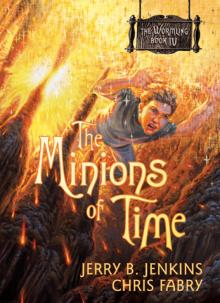 The Minions of Time
The Minions of Time Wild Rescue
Wild Rescue Though None Go with Me
Though None Go with Me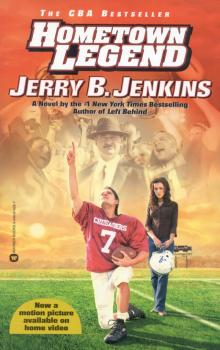 Hometown Legend
Hometown Legend The Breakthrough
The Breakthrough The Youngest Hero
The Youngest Hero Nicolae High
Nicolae High Through the Flames
Through the Flames The Brotherhood
The Brotherhood Grave Shadows
Grave Shadows The Changeling
The Changeling Shadowed
Shadowed Precinct 11 - 01 - The Brotherhood
Precinct 11 - 01 - The Brotherhood Second Chance
Second Chance Silenced
Silenced The Vanishings
The Vanishings Dead Sea Rising
Dead Sea Rising Soon
Soon The Author's Blood
The Author's Blood The Sword of the Wormling
The Sword of the Wormling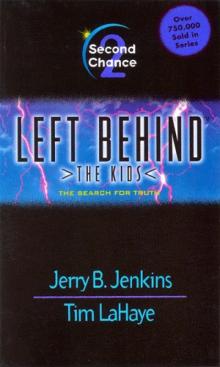 Left Behind - The Kids 02 - Second Chance
Left Behind - The Kids 02 - Second Chance Haunted Waters
Haunted Waters The Underground
The Underground Mark's Story
Mark's Story Shaken
Shaken Deceived
Deceived Frantic
Frantic Riven
Riven Facing the Future
Facing the Future Stung
Stung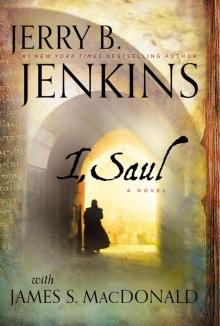 I, Saul
I, Saul Hunted
Hunted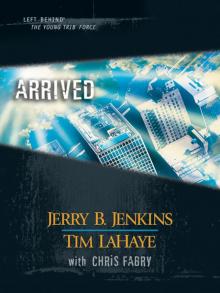 Arrived
Arrived John's Story
John's Story Stolen Secrets
Stolen Secrets